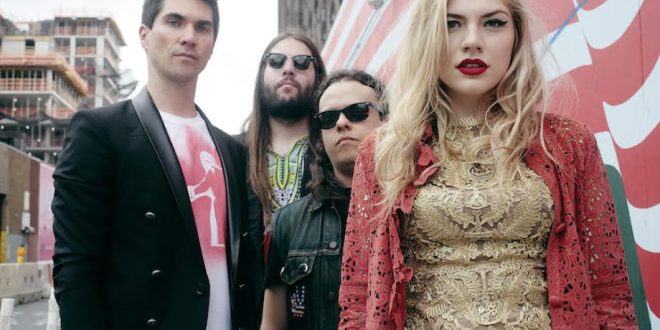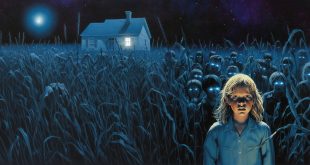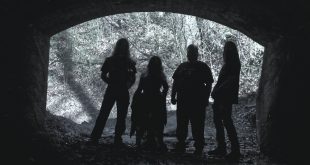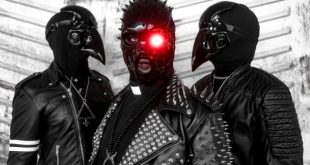Last year, New York’s Scarlet Sails was formed by the husband-and-wife core of drummer Brian Viglione and vocalist Olya. The band has earned credibility as a touring act, adding the soulfully heavy rhythms of Nick Emde and Jesse Krakow (guitar and bass, respectively). They recently wrapped a tour with Nina Diaz, having a self-titled EP under their belt and another planned for next year.
While Brian and Olya’s musical upbringings may contrast to a degree, they are united by past hardships, a passion for alternative rock, and a sincere admiration for the other’s abilities. In fact, the journey that led to their uniting is what justifies such enduring love.
I was pleased to have interviewed both Brian and Olya amidst their tight schedule. Simply discussing their formative days, their challenges, and just how much Scarlet Sails represents their marriage, it’s fair to say I am truly impressed.
ME: Olya – Let’s go back to when you were five years old. You had found a ‘song in your heart’ that sparked your passion for music. Was this a piece of music that particularly resonated with you, or had you just become more aware of music’s impact in general?
O: At five years I started learning how to play the piano. That’s where my love for music began. I can’t remember any particular piece of music, but I was really fascinated with Tchaikovsky’s Children’s Album.
ME: You were later classically trained at Moscow Prokofiev School of Music No. 1, which did not allow any original expression. Did you feel your creativity was being compromised?
O: Yes. I remember when I was seven or eight. For the first time, I showed my teacher a couple of chords and a melody I put together, and instead of being encouraging about composing original music, she acted frustrated at me and said that I needed to go back to learning “actual” music. My mom was always encouraging me to keep creating, so it balanced out a bit.
Despite being one of the best students in town, I had to eventually quit music school at the age of 12 because my piano teacher demanded tremendous amounts of work from me and never acknowledged that I was a good student. She always tried to put me down and I was done having it.
ME: What kind of modern music (albums, songs) had a deeper impact on you beyond what you learned in school?
O: Definitely Queen and Freddie Mercury. I remember watching their music videos and being fascinated with the worlds they were creating. Both of my parents really loved them, and they had a couple of bootleg vinyl from when Russia was under the Soviet Union. That kind of rock ’n’ roll stuff you could get only at a black market for an enormous price.
The second time I remember being struck by a music lightning bolt was when I was 12. I heard “Fallin’” by Alicia Keys on the only radio station that played that kind of stuff. A couple of female fronted Russian rock bands had a strong impact on me. Those were called Night Snipers and Zemfira. I used to go to all of their shows and was a part of their official fan clubs. Both of them had really strong lyrical parts in their songs. They were representing strength and uniqueness, and going against the rules, and I was highly impacted by that. Then, it was The Bends album by Radiohead on repeat.
Also, I was fond of a lot of brit rock bands in my teens, like Oasis, The Verve, Travis, and Franz Ferdinand. When I came to New York, I learned about the punk scene and fell in love with bands like Television, Blondie, and The Ramones.
ME: Speaking of New York, how did your parents react when you decided to move there?
O: They were shocked. I remember coming out of a catholic church on 5th avenue after walking around Manhattan the whole day and calling my parents’ house. My dad picked up. I was so inspired by the city that I was on a natural high, and I said to my dad, “I think this is it. I think this is what I was waiting for all my life. I think… I’m gonna stay”, and he said, “I think you need to get some sleep and get a reality check,” (laughs!)
You know, I came here only for the summertime and I only had a backpack, a few hundred dollars, and a language barrier—my English skills were very minimal. So when I decided I was going to apply for an English school, take vocal lessons, and stay in New York, they thought I had gone mad.
ME: What did the city end up providing you in terms of artistic freedom?
O: Everything, and then more (laughs)! Growing up in Russia, I felt like I was a hero in one of Kafka’s books. I felt like I was trapped and couldn’t find a way out, and when I thought I had found an oasis, it almost always appeared to be a mirage.
When I first walked the streets of New York, I felt like all those doors that I thought didn’t exist at all appeared to me at once and were just ready for me. After all this time being desperate, all I had to do was to pick the door and turn the knob. It was a really incredible feeling that I couldn’t abandon. I had to comply (laughs)!
ME: Certain aspects of your pursuit didn’t go as planned, namely when your employment and your living situation had dissolved. Tell me a bit about the events leading up to that time, and how you grew stronger from that experience.
O: I had applied for a summer program represented by an agency that once came to my university. They did a presentation for all the students who wanted to work, travel, learn new languages and explore the world. It sounds innocent, but it wasn’t.
After going through all the paperwork and receiving an American visa in my passport, I was beyond ecstatic to fly for the first time and go abroad (also for the first time) to one of the most incredible cities on the planet— New York! But unfortunately, the agency, while fulfilling some parts of the agreement, didn’t hold up to the main part, and also appeared to be a scam.
I arrived in New York with the official job offer and a place to stay provided by the employer. But the employer wasn’t really interested in providing a job for me. Instead, he just wanted to get sexy with me. I refused, which resulted in him trying to kick me out of the room where I was supposed to stay. And, of course, there was no job to be had.
I had to learn to be strong and stand up for myself. I was a homebody before, not having experienced the world. That meant becoming a street cat and learn how to operate in the city as wild as New York on my own. I had to find a job, a place to stay, and I had to start speaking English really quick. I was learning the hard way, but it was worth it, and definitely shaped me as a person. It gave me inspiration and an instant desire to help others and be compassionate. Somehow I believed in my higher purpose through it all. Reflecting back on that first year, I don’t really know how I made it.
ME: Eventually, you made a fateful connection while working at the Electric Bowery, punk rock legend Jesse Malin. In ways did he push you further toward your goal, not only as a mentor but as a friend?
O: Jesse Malin inspired me on many levels. He’s one of the most hardworking people I know, and I admire his dedication and passion for life and music. He took me on my first rock ’n’ roll tour as a sideman. I was playing keyboards in his band, and that was an incredible experience for someone who was completely new to the scene. We played something like nine shows in five days. I got to share the stage with Clem Burke from Blondie, Wayne Kramer, and Urge Overkill, hang out with Sean Lennon, Slash, and many other incredible musicians backstage.
As you’d understand, that was mind-blowing for someone who used to listen to American music in her walkman, trying to sing along and imagine how far that music came from, which felt like Mars. So I feel very lucky to have had Jesse’s support to this day. He opened new doors for me and made me push my creative ability to the next level.
ME: Looking back, do you feel your classically trained upbringing helped you gain a better understanding and appreciation for music in general?
O: I think classical music is a great foundation to build on. It gives you a deeper understanding. It helps you appreciate a well-composed song, pushes you out of your comfort zone as a writer/composer, and makes you want to explore all kinds of chords and sounds that haven’t been used before.
ME: Brian — When your father passed his passion for drums onto you, was this especially efficient in solidifying your bond with each other?
B: Absolutely. Our parents helped expose us not only to exciting experiences in the world but my father especially. He influenced my entire ethic around drumming and expressing my own voice through the instrument. He always took great joy in going to music shops with me and pouring over drum gear, haggling with the sales clerks, testing out the sounds of cymbals, and letting me try out the floor models of different kits, but mostly it was just quality “father and son” time together.
I think it was a stress reliever for him as well. But he was a great informal teacher and coach for me. He knew just the right balance of pushing me with new challenges and correcting potential bad habits, and also laying off and letting me enjoy the experience of making music and learning at my own pace, with my instincts guiding my interest in developing.
ME: Were there any particular records that you and your father both had a strong appreciation for? At what point did they help with that developent—your own individual drumming style?
B: My father used to play his favorite drummers for me that he loved growing up all the time, and would point out specific sections he wanted me to pay attention to. I have very vivid memories of him playing the first Led Zeppelin album and pointing out Bonham’s kick drum pattern in Good Times Bad Times. Also, Ginger Baker’s drum solo in “Toad” on [Cream’s] Wheels of Fire Album, and plenty of songs with Corky Lang from Mountain, Grand Funk [Railroad], Deep Purple, and he loved Mitch Mitchell with [Jimi] Hendrix.
He also loved the jazz greats and took me to see Elvin Jones and Tony Williams live in concert at the Regatta Bar in Cambridge. He would get me videos of Buddy Rich, Gene Krupa, Dave Weckl, Terry Bozzio, and Bernard Purdie. So I absorbed a wide variety of drumming styles early on, and my father taught me there was something valuable to learn from all of them. All these guys were immediate influences on me. I really tried to pay attention to what they were doing and filter it into a blend that reflected what I felt inside of me.
ME: At home, you aimed to hone your craft as a musician, while for others it was all about drink and drugs. Even with regular jam sessions in place, was it initially difficult to find other musicians who shared your level of ambition and discipline?
B: Perhaps in a broad sense, but at the time I felt very lucky to have a big group of friends who loved to come over and jam after school as much as I did. So I didn’t look at it like a lack of focus on their part. I just reveled in the fun of simply playing every chance I got and stayed focused on my personal goals on my own time. I moved on to other bands accordingly when the time was right. I certainly wouldn’t be here without those guys, and I think it was precisely our focus on the joy of playing music for each other, rather than pure ambition, which made it such an invaluable part of growing up.
My ambitions were really more of a deep calling than a desire to be successful. Music and drumming were survival mechanisms for both me and my friends. We were driven to play to create the world outside of our often difficult day-to-day lives. I knew that I wanted to be a part of the continuum of musicians who would help other people through hard times, just as I had. That was my major driving force as a kid, actually.
ME: Henry Rollins’ book Get in the Van was crucial to your joining the Boston punk scene. What was it about the book that resonated with you on a deep level?
B: The message of “Don’t be afraid to create the life you want” was what really struck me. It’s having the courage to break out of your comfort zone, even though it may be eating away at you from the inside, we often stick with what’s familiar to avoid the fear of the unknown.
At the time, I was in a very difficult relationship with a girlfriend five years older than me. I was helping raise her daughter while working a terrible paper factory job in Milford, New Hampshire. But I realized that I had to be fully accountable for my life and happiness. That meant not be too afraid to take risks. I knew that I was far too young to me a parent at 19 years old in a bad relationship, and I had to honor the dream and go for it with everything I had.
Rollins taught me about the need to work hard, work smart, keep your humility, and to take care of yourself. Stave off the temptations of running off the rails when life gets too hard to bear and find the strength within to get done what you need to stay true to yourself. His writing and music with early Rollins Band and Black Flag were real sources of release during some of the most difficult years of my life.
ME: Once you got involved in the scene, what did it provide for you in terms of releasing that stress?
B: Mostly, it was just exciting to find a new group of friends who loved making the same music I did. They shared the same sense of humor and feeling about life. No one I grew up with, even my closest friends back home really cared much for the punk and hardcore bands I liked, and at the time, I was extremely emotionally pent up and desperate for release. So the intensity of the music was nothing short of therapeutic!
I was provided a force that kept me from feeling like I wanted to crash my car off the highway. There were a lot of fun kids and characters in the Boston and Cambridge punk scene when I was there and made friends, so it was a nice sense of belonging. Going to house shows, volunteering at Food Not Bombs, just engaging with the community of kids there at the time was very liberating.
ME: Besides punk rock, you had also expanded within the general alternative spectrum, drumming for bands like Violent Femmes, Nine Inch Nails, and Dresden Dolls. What had you learned from your time in each band, considering your stylistic progression?
B: The Dresden Dolls gave me the opportunity to plumb the depths of my imagination. It’s because of space I was allowed not only sonically being that we were just a duo, but in the ways I could orchestrate, getting to explore the full spectrum of sounds and ways of drawing sounds from the kit. Amanda [Palmer] had a wide range of styles she wrote in; pop songs, theatrical cabaret songs, ballads, aggressive rock numbers, jazzy swing songs, and so on running the gamut. It pushed my performance style as well which informed my drumming to become much more dynamic and nuanced in that band.
Violent Femmes was an interesting exercise in reductionism. They adhere to a very simple set up, but they love to improvise and you can do a tremendous amount with relatively little when you have clear parameters to work in, and that’s a great way to key into the finer details of how the ensemble is playing off each other.
Recording with Nine Inch Nails was a chance to explore newfound percussion and unique sounds. I built a drum kit that was functional, but at the same time totally out of the ordinary. Trent [Reznor] is like the Prince of heavy, electronic/ industrial music to me. There’s always a huge emphasis on the groove in his music while taking a fresh sonic approach.
It’s worth noting that I learned a lot from other less well-known bands I’ve played with, such as The World/Inferno Friendship Society and Botanica. I focused on control and dynamics and nuances of feel, where you had to really nail it for those songs to come across properly. The most important thing is to listen to what’s going on around you, and support that in the most eloquent and appropriate way.
ME: With every new drumming opportunity you are presented, do you still think back to your bond with your father every now and then?
B: For me, it’s not even a matter of having to look back. He still comes to all the Scarlet Sails and Dresden Dolls shows and remains constantly supportive every step of the way. He would even come and help me break down my gear after certain shows a few years back, and help me load out the PA system at [mine and Olya’s] wedding celebration. He still gives great pep talks to any of us who might need it. My father’s message has always been “Believe in yourself and give it everything you’ve got.”
ME: Brian and Olya — What was your first impression of one another, and how did you feel once you became closer?
B: My first impression was that Olya was the most beautiful thing I had ever seen. Her warm smile and genuine, friendly demeanor were the most refreshing thing I’d encountered in the grand city of New York. I don’t think I made the same impact on her in my sweaty cut-offs and unassuming disposition (laughs)!
O: I thought Brian was really sweet and super friendly and felt comfortable talking to him. At that time, I had just gotten out of a long-term relationship and didn’t want to get involved with anyone, so I didn’t look at him that way at first. But his tactics were brilliant and his persistence paid off (laughs!). He won my heart as a real knight. And once we became closer there was no way back. We knew the connection was special, and that we were incredibly lucky to find each other in this crazy world.
ME: At what point did your feelings for each other start deepening to such an extent? Were you initially scared, or had you already established a mutual understanding?
B: I was absolutely crazy for Olya right off the bat. I just knew she was my true love. But I knew that she was most likely the object of many people’s desire and above all, I wanted to earn her trust first before getting romantic. If we couldn’t have a trusting friendship, I knew we’d have no real foundation for growing closer. So I wanted to go along at her pace.
O: And you did a beautiful job at it. Although I was initially on guard, our connection started deepening very early on and very naturally so. Brian was honest and passionate, and he didn’t play games with me. Eventually he led me to believe in love again and I had to let my guard down. Deep down, I knew that he was the one.
ME: As part of Scarlet Sails, what kind of energy do you bring to the band?
O: Raw, powerful, daring.
B: Supportive, driving and focused.
ME: Your most recent single, “I’ll Be There,” seems to not only represent the endurance of your relationship, but your marriage as a whole. Is there an underlying friendship that keeps you two on the same path?
B: Absolutely. In fact, our friendship and shared sense of passion and purpose were the linchpins of our whole relationship. From there, we have loved getting to know each other and intertwine all the other aspects of our lives. Both of us feel incredibly fortunate. It’s a very rare thing and we plan on nurturing our bond and not taking any of this for granted.
ME: What do you think your parents might say to you now, given your growth and success as both artists and people?
O: They all say that they’re very happy and proud of us. All parents worry that their kids will have steady work and find a place in the world, especially when those kids decide to form a rock band. But they see how hard we are working and how it is paying off. We’re a team and that makes them feel very excited for the future.
Scarlet Sails Socials:
Official Website|Instagram|Facebook|<a href=”http://Olya Twitter
 Music Existence Because of Music, We Exist
Music Existence Because of Music, We Exist




